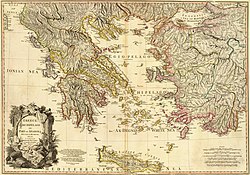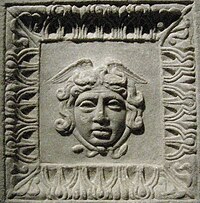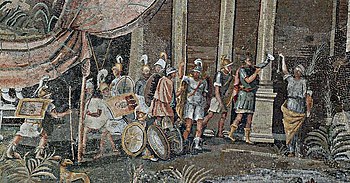Hellenistic Greece
It has been suggested that this article be merged into Hellenistic period. (Discuss) Proposed since January 2024. |
This article includes a list of general references, but it lacks sufficient corresponding inline citations. (February 2023) |
| History of Greece |
|---|
 |
|
|
Hellenistic Greece is the historical period of the country following
The Hellenistic period began with the wars of the Diadochi, armed contests among the former generals of Alexander the Great to carve up his empire in Europe, Asia, and North Africa. The wars lasted until 275 BC, witnessing the fall of both the Argead and Antipatrid dynasties of Macedonia in favor of the Antigonid dynasty. The era was also marked by successive wars between the Kingdom of Macedonia and its allies against the Aetolian League, Achaean League, and the city-state of Sparta.
During the reign of
During the Hellenistic period the importance of Greece proper within the Greek-speaking world declined sharply. The great centers of
Macedon

The quests of Alexander had a number of consequences for the Greek city-states. It greatly widened the horizons of the Greeks, making the endless conflicts between the cities which had marked the 5th and 4th centuries BC seem petty and unimportant. It led to a steady emigration, particularly of the young and ambitious, to the new Greek empires in the east. Many Greeks migrated to Alexandria, Antioch and the many other new Hellenistic cities founded in Alexander's wake, as far away as what are now Afghanistan and Pakistan, where the Greco-Bactrian Kingdom and the Indo-Greek Kingdom survived until the end of the 1st century BC.
The defeat of the Greek cities by
Following Alexander's death a struggle for power broke out among his generals, which resulted in the break-up of his empire and the establishment of a number of new kingdoms. Macedon fell to Cassander, son of Alexander's leading general Antipater, who after several years of warfare made himself master of most of the rest of Greece. He founded a new Macedonian capital at Thessaloniki and was generally a constructive ruler.
Cassander's power was challenged by Antigonus, ruler of Anatolia, who promised the Greek cities that he would restore their freedom if they supported him. This led to successful revolts against Cassander's local rulers. In 307 BC, Antigonus's son Demetrius captured Athens and restored its democratic system, which had been suppressed by Alexander. But in 301 BC a coalition of Cassander and the other Hellenistic kings defeated Antigonus at the Battle of Ipsus, ending his challenge.

After Cassander's death in 298 BC, however, Demetrius seized the Macedonian throne and gained control of most of Greece. He was defeated by a second coalition of Greek rulers in 285 BC, and mastery of Greece passed to the king
Antigonus II ruled until his death in 239 BC, and his family retained the Macedonian throne until it was abolished by the Romans in 146 BC. Their control over the Greek city states was intermittent, however, since other rulers, particularly the Ptolemies, subsidised anti-Macedonian parties in Greece to undermine the Antigonids' power. Antigonus placed a garrison at
In 267 BC,
City states and leagues
In spite of their decreased political power and autonomy, the Greek city state or polis continued to be the basic form of political and social organization in Greece. Classical city states such as Athens and Ephesus grew and even thrived in this period. While warfare between Greek cities continued, the cities responded to the threat of the post Alexandrian Hellenistic states by banding together into alliances or becoming allies of a strong Hellenistic state which could come to its defense therefore making it asylos or inviolate to attack by other cities.
The Aetolians and the Achaeans developed strong federal states or leagues (koinon), which were governed by councils of city representatives and assemblies of league citizens. Initially ethnic leagues, these leagues later began to include cities outside of their traditional regions.
After Alexander's death,
Philip V
Antigonus II died in 239 BC. His death saw another revolt of the city-states of the
Sparta remained hostile to the Achaeans, and in 227 BC Sparta's king Cleomenes III invaded Achaea and seized control of the League. Aratus preferred distant Macedon to nearby Sparta, and allied himself with Doson, who in 222 BC defeated the Spartans and annexed their city – the first time Sparta had ever been occupied by a foreign power.
Philip V, who came to power when Doson died in 221 BC, was the last Macedonian ruler with both the talent and the opportunity to unite Greece and preserve its independence against the "cloud rising in the west": the ever-increasing power of Rome. He was known as "the darling of Hellas". Under his auspices the Peace of Naupactus (217 BC) brought conflict between Macedon and the Greek leagues to an end, and at this time he controlled all of Greece except Athens, Rhodes and Pergamum.
In 215 BC, however, Philip formed an alliance with Rome's enemy Carthage, which drew Rome directly into Greek affairs for the first time. Rome promptly lured the Achaean cities away from their nominal loyalty to Philip, and formed alliances with Rhodes and Pergamum, now the strongest power in Asia Minor. The First Macedonian War broke out in 212 BC, and ended inconclusively in 205 BC, but Macedon was now marked as an enemy of Rome. Rome's ally Rhodes gained control of the Aegean islands.
In 202 BC, Rome defeated Carthage, and was free to turn her attention eastwards, urged on by her Greek allies, Rhodes and Pergamum. In 198 BC, the Second Macedonian War broke out for obscure reasons, but very likely because Rome saw Macedon as a potential ally of the Seleucids, the greatest power in the east. Philip's allies in Greece deserted him and in 197 BC he was decisively defeated at the Cynoscephalae by the Roman proconsul Titus Quinctius Flamininus.
Luckily for the Greeks, Flamininus was a moderate man and an admirer of Greek culture. Philip had to surrender his fleet and become a Roman ally, but was otherwise spared. At the Isthmian Games in 196 BC, Flamininus declared all the Greek cities free, although Roman garrisons were placed at Corinth and Chalcis. But the freedom promised by Rome was an illusion. All the cities except Rhodes were enrolled in a new League which Rome ultimately controlled, and democracies were replaced by aristocratic regimes allied to Rome.
Rise of Rome

In 192 BC, war broke out between Rome and the Seleucid ruler
During the following years Rome was drawn deeper into Greek politics, since the defeated party in any dispute appealed to Rome for help. Macedon was still independent, though nominally a Roman ally. When Philip V died in 179 BC, he was succeeded by his son
End of Greek independence
As a result of Eumenes's intrigues Rome declared war on Macedon in 171 BC, bringing 100,000 troops into Greece. Macedon was no match for this army, and Perseus was unable to rally the other Greek states to his aid. Poor generalship by the Romans enabled him to hold out for three years, but in 168 BC the Romans sent Lucius Aemilius Paullus to Greece, and at Pydna the Macedonians were crushingly defeated. Perseus was captured and taken to Rome, the Macedonian kingdom was broken up into four smaller states, and all the Greek cities who aided her, even rhetorically, were punished. Even Rome's allies Rhodes and Pergamum effectively lost their independence.
Under the leadership of an adventurer called
In 146 BC, the Greek peninsula, though not the islands, became a Roman protectorate. Roman taxes were imposed, except in Athens and Sparta, and all the cities had to accept rule by Rome's local allies. In 133 BC, the last king of Pergamum died and left his kingdom to Rome: this brought most of the Aegean peninsula under direct Roman rule as part of the province of Asia.

The final downfall of Greece came in 88 BC, when King
Further ruin was brought to Greece by the Roman civil wars, which were partly fought in Greece. Finally, in 27 BC,
See also
- Ancient Greek architecture
- Ancient Greek art
- Culture of ancient Greece
- Hellenization
References
- ^ Hellenistic Age. Encyclopædia Britannica, 2013. Retrieved 27 May 2013. Archived here.
- ^ Sarah B. Pomeroy, Stanley M. Burstein, Walter Donlan, Jennifer Tolbert Roberts, and David Tandy, Ancient Greece: A Political, Social, and Cultural History, 2011, p. 476.
Further reading
- Austin, M. M. The Hellenistic World From Alexander to the Roman Conquest: A Selection of Ancient Sources In Translation. Cambridge: Cambridge University Press, 1981.
- --, editor and translator. The Hellenistic world from Alexander to the Roman conquest: A selection of ancient sources in translation. 2nd edition. Cambridge: Cambridge University Press, 2006.
- Bagnall, Roger, and Peter Derow, editors and translators. Historical sources in translation: The Hellenistic period. 2nd edition. Oxford: Blackwell, 2004.
- Bugh, Glenn. R., editor. The Cambridge companion to the Hellenistic world. Cambridge: Cambridge University Press, 2006.
- Chaniotis, Angelos. War in the Hellenistic world: A Social and Cultural History. Malden, MA: Blackwell, 2005.
- Crook, J. A., Andrew Lintott, and Elizabeth Rawson, editors. The Cambridge ancient history. volume IX, part 1: The last age of the Roman Republic, 146–43 BC. 2nd edition. Cambridge: Cambridge Univ. Press, 1994.
- Errington, R. Malcolm. A history of the Hellenistic world, 323–30 BC. Malden, MA: Blackwell, 2008.
- Erskine, Andrew, editor. A companion to the Hellenistic world. Malden, MA: Blackwell, 2003.
- Green, Peter. Alexander to Actium: The Historical Evolution of the Hellenistic Age. Berkeley: University of California Press, 1990.
- Gruen, Erich S. The Hellenistic world and the coming of Rome. Berkeley: University of California Press, 1984.
- Lewis, David M., John Boardman, Simon Hornblower, and Martin Ostwald, editors. The Cambridge ancient history, volume VI: The fourth century BC. 2nd edition. Cambridge: Cambridge University Press, 1994.
- Shipley, Graham. The Greek World after Alexander, 323–30 BC. London: Routledge, 2000.
- Walbank, Frank W. A historical commentary on Polybius. Volume I: Commentary on Books I–VI. Volume II: Commentary on Books VII–XVIII. Volume III: Commentary on Books XIX–XL. Oxford: Clarendon Press, 1957–79.
- --. The Hellenistic World. Brighton, Sussex: Harvester Press, 1981.
- Walbank, Frank W., Alan E. Astin, Martin W. Frederiksen, and Robert M. Ogilvie, editors. The Cambridge ancient history, volume VIII: Rome and the Mediterranean to 133 BC. 2nd edition. Cambridge: Cambridge University Press, 1989.
- --. The Cambridge ancient history, volume VII, part 1: The Hellenistic world. 2nd edition. Cambridge: Cambridge University Press, 1994.
External links
 Media related to Hellenistic Greece at Wikimedia Commons
Media related to Hellenistic Greece at Wikimedia Commons
